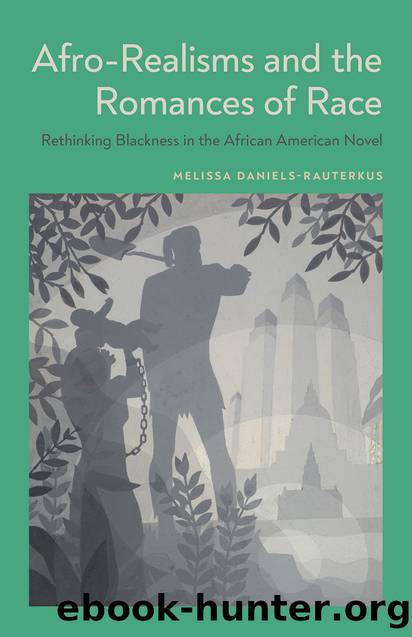Afro-Realisms and the Romances of Race by Melissa Daniels-Rauterkus

Author:Melissa Daniels-Rauterkus
Language: eng
Format: epub
Publisher: LSU Press
Published: 2020-01-15T00:00:00+00:00
The Quagmire of Race and Gender
After breaking off the engagement, George has a series of changes of heart and seeks contact with Rena. At one point he writes her a letter, asking for an interview, but she rebuffs his proposal on two counts: race and respectability. Rena argues that there would be no point in meeting since George has already drawn the color line: âYou are white, and you have given me to understand that I am blackâ (172). And she points out that they would not be able to meet without controversy: âAs a white man, this might not mean a great deal to you; as a woman, shut out already by my color from much that is desirable, my good name remains my most valuable possessionâ (172â73). In this pivotal exchange, Rena acknowledges her vulnerable position as a woman of color. And a critical late scene in the novel concretizes this vulnerability, as she finds herself faced with a literal and metaphorical fork in the road, with George on one path, and Wain on the other.
In this scene, Chesnutt adopts the naturalistic plot of declineâa sequence of events that illustrate a characterâs gradual deterioration or progression toward deathâto highlight the ways in which Renaâs racial reality is, in Ryan Simmonsâs words, ârelatively bound by her environmentâ (69).12 As Simmons has explained, in the latter pages of the novel, roughly chapters 21 through 33, Renaâs âbehavior is not biologically drivenâas [George] assumes it has been . . . but it is constrained by historical circumstancesââfor example, race, class, and gender (69). When Rena comes to the fork in the forest, all of these forces collide, and she is literally bound by her surroundings. Because she has free will only within the parameters that her culture has delineated, she must make the most of her limited options. Chesnutt prioritizes Renaâs limited choices to explore the question of moral agency. As a realist, Chesnutt wants to give Rena the ability to make her own decisions. But he also wants to show how her decisions are restricted by the constraints of race and gender. Like John, Rena could continue to pass in some new setting where she is not known, but instead, Chesnutt has her teach at an all-black school to make fun of, and thus subvert, a contrived plot point to highlight her lack of options. Chesnuttâs point is that Renaâs social circumstances render her relatively powerless. If she continues to pass, she might get caught, and who is to say that the next white man will be as discreet as George? If she goes back to George, she will presumably have to pass for the rest of her life or live in secrecy as his black mistress. If she chooses Wain, she risks physical abuse and sexual degradation. Ultimately, then, what the final section of the novel demonstrates is how Renaâs race and gender place her in a vicious moral quagmire that Chesnutt literalizes in the swamp sequence.
In this gripping
Download
This site does not store any files on its server. We only index and link to content provided by other sites. Please contact the content providers to delete copyright contents if any and email us, we'll remove relevant links or contents immediately.
The Power of Myth by Joseph Campbell & Bill Moyers(1057)
Half Moon Bay by Jonathan Kellerman & Jesse Kellerman(979)
Inseparable by Emma Donoghue(976)
A Social History of the Media by Peter Burke & Peter Burke(975)
The Nets of Modernism: Henry James, Virginia Woolf, James Joyce, and Sigmund Freud by Maud Ellmann(891)
The Spike by Mark Humphries;(809)
The Complete Correspondence 1928-1940 by Theodor W. Adorno & Walter Benjamin(783)
A Theory of Narrative Drawing by Simon Grennan(775)
Culture by Terry Eagleton(770)
Ideology by Eagleton Terry;(733)
World Philology by(712)
Farnsworth's Classical English Rhetoric by Ward Farnsworth(711)
Bodies from the Library 3 by Tony Medawar(707)
Game of Thrones and Philosophy by William Irwin(707)
High Albania by M. Edith Durham(699)
Adam Smith by Jonathan Conlin(686)
A Reader’s Companion to J. D. Salinger’s The Catcher in the Rye by Peter Beidler(676)
Comic Genius: Portraits of Funny People by(649)
Monkey King by Wu Cheng'en(646)
